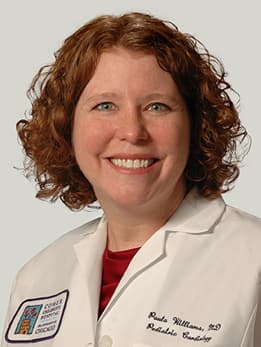Congenital Colorectal Anomalies
The University of Chicago Medicine's Comer Children's Hospital is a leader in providing care for babies, infants and children with complex anorectal malformations. Our Pediatric Colorectal Reconstruction Center offers a unique, multidisciplinary approach to diagnosis, treatment and long-term management of imperforate anus, cloaca and Hirschsprung's disease. Through the continued care of our expert medical team, we help our patients live healthy, productive and high-quality lives.
Coordinated Care for Complex Conditions
Colorectal malformations are complex conditions that occur when the anus and rectum do not properly develop. In addition to affecting the lower end of the digestive tract, these disorders may impact a child's urinary tract (bladder) and/or spinal cord. As a result, it's important to seek care from specialists who understand the intricacies of these conditions and can provide ongoing support. Our multidisciplinary team includes experts in pediatric colorectal surgery, neurosurgery, urology, orthopaedic surgery, radiology, cardiology, gastroenterology and nutrition. The team members, each of whom is specially trained to treat anorectal malformations, meet regularly to discuss cases and develop comprehensive, individualized treatment plans.
At Comer Children's, our clinicians and staff work closely together to ensure families have scheduled consultations with all appropriate medical experts in as close of a time frame as possible. During these appointments, our physicians conduct a comprehensive examination of the patient, perform appropriate radiologic studies, educate the family about their child's condition and discuss treatment options. We take extra care to ensure families are fully informed throughout the process. In addition to our conversation in the clinic, we provide educational materials so families can share treatment plans with other caregivers, such as grandparents, babysitters, day care providers and teachers.
Types of Colorectal Malformations
Children with imperforate anus are at high-risk of having other congenital anomalies. The grouping of anomalies that often occur together are known as the VACTERL association, which stands for vertebrae (spine), anus, cardiac (heart), tracheoesophageal, renal (kidney) and limbs (most commonly the arms). Due to the high frequency of these associated anomalies, it is important that children with imperforate anus receive holistic and comprehensive care from a multidisciplinary team of specially-trained experts.
Treating cloaca requires reconstruction of the perineum (space between the anus and the vulva) to create separate openings for the urethra, anus and vagina. It also is important for girls with cloaca to receive coordinated care from experts in related specialties, as these patients often experience altered bowel and bladder function that requires careful management and ongoing follow-up.
Treatment for Hirschsprung's disease requires removal of portions of the colon (also known as the large bowel or large intestine) not containing nerve cells. It is important that infants who undergo this treatment receive close follow-up and ongoing care. This will help ensure proper healing and lower the risk of developing an infection. It will also limit chronic constipation or incontinence (leaking of urine).






